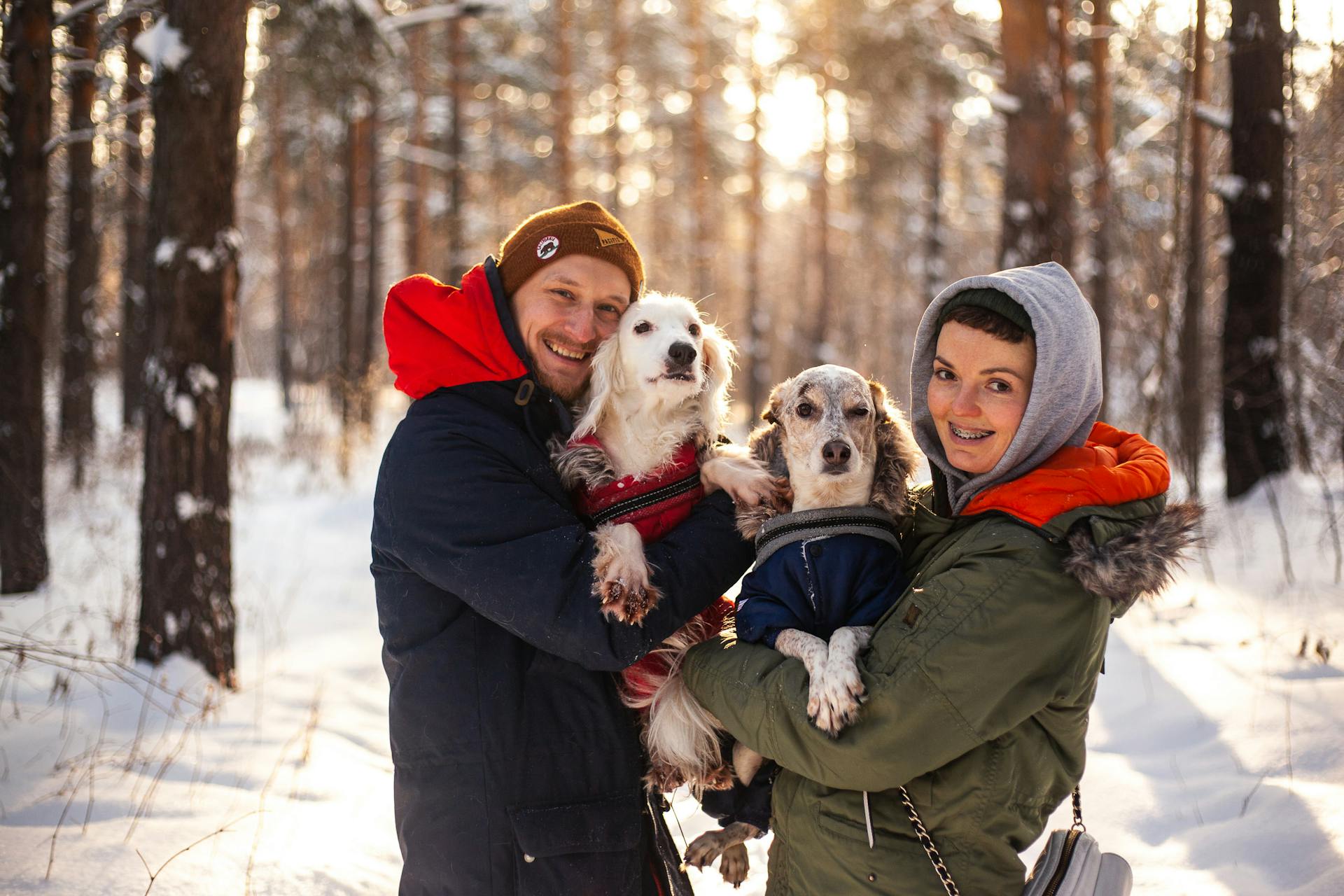
If you want to become a SAR (Search and Rescue) Dog Handler, you'll need to have some special skills and knowledge. Here are some tips on how to make it happen:
1. Get the right qualifications. Becoming a SAR Dog Handler requires certain credentials. In order to certify as a handler, you’ll have to show proficiency in basic obedience and trainability skills, as well as pass tests of knowledge in search methods and wilderness safety procedures.
2. Understand the roles of dog handlers in search-and-rescue operations. During an emergency situation, dog handlers act as liaisons between the search team leader and their own dogs, guiding them through terrain and using their trained eyes to spot signs that indicate somebody may be lost or injured nearby. They all need excellent communication skills since they will be expected to report any findings from the field in depth back at base camp via radio or other devices like phones or computers if needed. Along with this, valuable organizational capabilities will also come into play when preparing for rescues involving multiple teams of handlers with their respective canines.
3. Learn about canine behavior. Being able understand what’s going on inside your dog’s mind is essential for successful search operations utilizing canines since identifying how a reaction affects other teams makes problem solving in times of crisis much easier than just relying on guesswork alone. To do this, trainers advise studying canine psychology courses available online – even if it’s not possible yet due to Covid travel restrictions – before heading out into rescue fields with an animal companion so both handler and dog can perform fluidly together during missions.
4. Become part of a volunteer search-and-rescue organization and offer your services as soon as possible. There are many organizations such as FEMA (USA Federal Emergency Management Agency) which require volunteers for SAR tasks but there is also opportunity being offered by volunteer -run agencies who specialize exclusively in providing training, resources, equipment etcetera– these aspect ranges from intensive physical tracking searches outdoors up till utilizing digital tools like Mobile Applications designed specifically for finding lost individuals faster throughout supported areas, making sure that groups out there helping will always get reliable support while they carry out their missions!
5 Lastly don't forget socializing both yourself & your pup!! So that when retrieving someone during high -stress situations both humans & animals involved stay safe while doing what they do best!
For more insights, see: Dog Handlers for Dog Shows
What qualifications do I need to become a SAR Dog Handler?
If you’re looking to become a Search and Rescue (SAR) Dog Handler, there are several qualifications that you should be aware of before diving in. SAR Dog Handlers are responsible for handling their dogs during search and rescue operations, making sure they remain safe while providing vital assistance to search teams. This can be an incredibly rewarding job and one that requires both knowledge and skill.
First and foremost, SAR dog handlers must have experience with basic tracking techniques. This includes understanding when a dog is on the right track so as not to waste valuable time searching for more obscure clues. Additionally, SAR dog handlers must understand how the wind affects scenting conditions when tracking a lost person or animal, so it is incredibly important for them to stay up-to-date on current weather conditions if possible. Furthermore, many organizations require their SAR dogs to be trained in avalanche awareness so that they may ultimately be used in such environments if needed; as a result numerous courses are typically offered every year in order to keep these handlers informed about current regulations/laws regarding this type of operation/search environment
In addition to the aforementioned tracker qualifications, most SAR departments will prefer applicants with an extensive background in canine breeds themselves since different breeds have different capabilities when it comes to detecting lost persons or objects related items under certain conditionings i.e., terrain types etc. Moreover having some sort of certified credentials regarding animal husbandry would also prove beneficial since such certifications demonstrate an overall knowledge & understandings relating towards canine behaviors which many times differ dependent upon who’s doing the navigating (known versus unknown individual(s)).
Finally most organizations require that all SARdog Handlers pass certain psychological evaluations prior being approved for service; this helps ensure applicants can handle stressful situations without panicking or shutting down which could lead into further problems - thus negatively impacting any rescue mission once out “into"the field". Ultimately if you meet these requirements then becoming a search and rescue dog handler should be within your sights!
Consider reading: Rescue Dogs as Service Dogs
What type of training do SAR Dog Handlers receive?
Search and Rescue (SAR) Dog Handlers receive specialized training to ensure that their dogs can perform the necessary tasks in hazardous situations. SAR Dogs must be intelligent and have the ability to independently solve complex problems.
This training begins with basic obedience and learning exercises such as heelwork and retrieving objects. This then progresses on to more demanding activities such as tracking, trailing, air scenting, area searches, agility courses, rappelling and rope work ascents/descents, or even water rescue.
The handler must be able to utilize verbal cues along with hand signals so that their dog remains engaged during the task at hand rather than becoming distracted by other environmental factors. These commands are designed for quickness and accuracy so that their dog can navigate through complex SAR environments unharmed in a timely fashion. Handlers also learn critical skills for back country navigation alongside their canine partner such as GPS usage and map reading skills combined with visual orientation abilities using terrain features as landmarks.
Additionally handlers are trained in basic first-aidshould they or their dog come across any medical issues while out on a search mission. This includes administering medications like antibiotics or hydration solutions if needed along with emergency bandaging techniques when required by the individual incident response scenario being faced at any given time during an operation in progress. For greater flexibility handlers also familiarize themselves with various emergency shelter optionsbest suited to challenging scenarios found while searching difficult terrainsimply due to changing weather dynamics typical of most storm systems crossing through mountainous regions common among many Search & Rescue locations world-wide.
Finally handlers educate themselves on safety practices from specific protocols applicable only within a designated agency/organization OR region-wide Wilderness Medicine concepts including how best response quickly when encountering any existing Health Hazardsthey may encounterwhile out performing backcountry operations requiring rapid rescues intimely manners..
Additional reading: The Year of the Puppy How Dogs Become Themselves
What qualities are important for SAR Dog Handlers to have?
Being a Search and Rescue (SAR) Dog Handler requires not just physical fitness and agility, but a range of specialised qualities too. From being dedicated to their canine companion to having a strong problem-solving mindset, SAR Dog Handlers should possess the following traits:
1. Physical & Mental Strength: SAR dog handlers need to have the physical strength to be able to keep up with their canine companion as well as the mental strength necessary for difficult search operations in tough environments. Additionally, endurance is key for SAR Dog Handlers - they may need to work on an operation for hours at a time in challenging terrain and often under pressure from concerned family members or emergency services personnel.
2. Empathy & Dedication: A compassion and empathy towards both people and animals is important, as is dedication towards their canine partner who they will be working alongside throughout operations. The relationship between handler and dog should always come first, especially during times of stress or difficulty where trust must be at its strongest if any progress is going to be made in terms of finding someone or something that has been lost/missing.
3. Problem-Solving Ability: It’s essential that SAR Dog Handlers are actively looking out for potential problems which may arise during an operation, making predictions ahead of time so they can tackle them quickly before any real disruption occurs on site. This not only helps with efficiency but could ultimately save precious minutes when searching an area more thoroughly than might otherwise be allowed by those directing operations from command central such as the local police department or other emergency services control centre.
4. Communication Skills : Strong communication skills are also very important in this role; clear instruction must given both orally whilst searching an area verbally via radios/mobile phones when time permits- both while communicating with support agencies on the ground, but also back at headquarters who are running searches remotely based upon intelligence available at hand – so quick decision making capacities must equally exist within these realms too . Also being able understand what information needs passing back quickly can prove invaluable rather than waiting until after grid sweeps are over etc...
Finally it's essential that Handlers stay cool under pressure, remaining focused even when things go wrong as it’s likely there willl situation specific moments where patience thin more than once ; easily frustrating one another due other individual preferences working out together too. In summary, anyone considering taking up this rewarding yet arduous role should make sure that all above qualities remain high priorities!
Worth a look: How to Become a Search and Rescue Dog Handler
How do I apply to become a SAR Dog Handler?
Applying to become a SAR Dog Handler is an exciting journey made up of three distinct stages—preparation, application and training. Preparation requires developing the necessary skills along with selecting and securing the right K9 partner for you.
To start, research the type of SAR Dog Handlers that exist in your area. Each unit or organization may have different requirements and eligible dogs which you should take into account when determining if it is a good fit for you. After deciding on what fits best, devise a plan to obtain any necessary skills or qualifications they might require such as currency with First Aid/CPR certifications, navigational skills and comfortable handling off-leash situations with your potential K9 partner.
Once prepared to submit an application, make sure all qualifications are laid out clearly in the form– any misspelled wordings could risk losing points due to incomplete applications being immediately disqualified–to be on point make sure all documents requested are included eg; certificates of completion from courses taken etc., registration papers for potential K9 partners etc.. This can usually be done electronically but if not double check everything before mailing them out in time to meet the deadline date listed within the job package document.
Upon successful completion of the application stage comes preparation for training which depending on location and organization could involve seminars educating handlers about appropriate behavior during search times along with other topics pertaining to aspects like public relations when responding/enacting searches involving rescue operations somewhere remote like landscapes such as mountain sides by conducting mock scenarios within similar terrains preparing handlers equipped & ready tackling whatever may arise upon meeting a callout list request.
Last step? Enjoying running tests required during evaluations ultimately successful attainment paying off hard work achieving Goal becoming Certified SAR Dog Handler - Awesome!
If this caught your attention, see: Dog Handlers
How much time is typically required to become a SAR Dog Handler?
It is difficult to answer the question of exactly how much time it takes to become a SAR Dog Handler, as it is highly individualized. Depending on the specific program you choose and the level of experience you have prior to joining, training can take anywhere from six months up to two years or more. First and foremost, prospective handlers must engage in an intensive and comprehensive apprenticeship with either a licensed SAR organisation or local law enforcement agency. This will include training in canine searches for various rescue disciplines like wilderness search and tracking, avalanches, water finds etc. From there, aspirants will embark on domestic and international trips for further field experience as well as specialised workshops conducted by industry professionals.
In addition to technical skills such as canine behaviour analysis and scent discrimination techniques, handlers must also possess adequate first-aid know-how; this includes everything from basic signs of sickness or injury in dogs right down to CPR knowledge should the worst case scenario occur during SAR operations. Furthermore, depending where they are working; many states require service dog handler certifications which requires adequate physical fitness tests & certifications (like first aid certificate).
The primary goal of any dedicated handler is not only mastery of their own professional development but that their bond with their K9 have sufficient bonding experiences so that they can support each other during difficult search missions while keeping alertness even when facing difficult terrain conditions. All these actions clearly demonstrate why becoming a competent Search & Rescue (SAR) Dog Handler requires exceptional commitment over considerable periods of time - but for those willing make such sacrifices; it pays its own reward in searching people’s lives around the globe.
You might like: Dog Grooming for Difficult Dogs
Is any special certification or licensing needed to become a SAR Dog Handler?
While there are no legally-required certifications or licenses to become a SAR (Search and Rescue) Dog Handler, some organizations may require their own specific qualifications. That being said, specialized SAR Dog certification courses are available for those wanting to perfect their training techniques. These courses offer handlers the opportunity to learn about assessing dogs for SAR work, legally responsible dog handling, how to read a search mission plan, how to conduct progressive scent tracking exercises and more. Additionally, upon completion of the course some schools offer an optional field evaluation which allows instructors to gauge the handler's skills in locating human subjects. Acquiring certification through acclaimed services further reveals a handler's level of proficiency and enhances the individual’s ability perform in real-life search and rescue scenarios effectively.
In most states it is required that SAR Dog Handlers must have attended an accredited training program before they can be entered into service as a qualified professional handler in local search teams or organizations. It is also generally expected that handlers have achieved one of several certifications from nationally recognized associations such as NASAR (National Association for Search & Rescue) among others prior on performing live searches with their assigned dog(s). Furthermore, staying up-to-date concerning any changes or additions made by governing entities through continuing education will keep you properly informed concerning best practices which can assure safe operation at all times during deployments within your area of servitude.
Regardless if given credentialing access from regional teams or elected individually by searching authorities; obtaining recognition from accredited bodies reflects both credibility & responsibility thus obtaining proper accreditation when dealing with life threatening circumstances should be taken seriously whereas taking formal validation courses plus testing can raise your visibility immensely when requesting trust & confidence amongst peers while ensuring you’re making ethical decisions during this emotionally involved situation many face every day in operations around the world!
Sources
- https://highlandcanine.com/search-and-rescue-dog-training/
- https://petkeen.com/how-to-become-a-search-and-rescue-dog-handler/
- https://yourcareersupport.com/how-to-become-a-dog-handler/
- http://mesard.org/requirements-for-mesard-sar-dog-handlers
- https://bdjobstoday.org/faq/can-you-get-a-career-in-sar-canine/
- https://wikidoggia.com/post/how-to-become-a-dog-handler
- https://wikidoggia.com/post/how-to-become-a-search-and-rescue-dog-handler
- https://www.amrg.info/canine-sar/become-a-sar-dog-handler
- https://iaabcjournal.org/canine-search-and-rescue/
- https://www.finedogtraining.com/therapy-training/how-to-become-a-certified-therapy-dog-handler
- https://www.frontiersin.org/articles/10.3389/fvets.2018.00118/full
Featured Images: pexels.com


